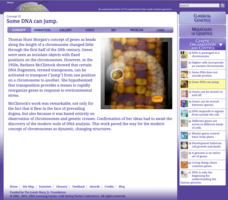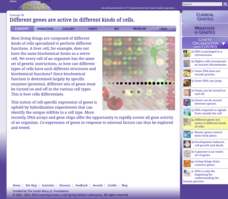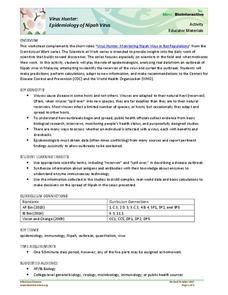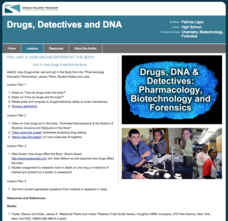Howard Hughes Medical Institute
DNA Profiling Activity
Everyone loves a good mystery ... can your class actually solve one? Partnered pupils take on the role of forensic investigators during a three-part activity focusing on DNA evidence processing. Learners discover the methods used to...
Cold Spring Harbor Laboratory
DNA Is Packaged in a Chromosome
Roger Kornberg, the oldest son of two biochemists, won the 2006 Nobel Prize in Chemistry. Learn about Kornberg and his scientific research with an animation, videos, biography, and an applied problem-solving activity. A summary and...
Cold Spring Harbor Laboratory
Some DNA Can Jump
Some people have a natural ability to jump, but did you know DNA also naturally jumps? Learn about the fun habit by looking at the research of a pioneering female scientist. Barbara McClintock fought prejudice and surpassed her mentors...
Howard Hughes Medical Institute
Ebola: Disease Detectives
How did the Ebola virus first infect humans? Young virologists examine genetic sequences from the 2014 Sierra Leone outbreak to find similarities during a riveting activity. Following similar methods used by MIT and Harvard, partners...
Cold Spring Harbor Laboratory
DNA Responds to Signals from Outside the Cell
How do cells know when to replicate, transcribe, and stop? James E. Darnell, Jr. shifted from studying medicine to biochemistry and decided to address this mystery. Learn about his research, discoveries, and the impact on future medical...
University of California
Migration of Early Humans: Evidence and Interpretations
While much of prehistory is cloaked in mystery, ancient ancestors left evidence in DNA, languages, and materials from their time. Using photographs of items such as cave paintings and ancient tools, as well as maps of linguistic patterns...
Cold Spring Harbor Laboratory
Different Genes Are Active in Different Kinds of Cells
Personalized medicine prevents many trial-and-error scenarios when time counts the most. Learn how gene expression and screening genomes improves health outcomes in cancer patients, those with auto-immune disorders, and more. An online...
Serendip
Genetic Engineering Challenge – How Can Scientists Develop a Type of Rice That Could Prevent Vitamin A Deficiency?
Brown rice contains vitamins B and E, while white rice lasts longer in storage. The availability of rice around the world makes it a great candidate for genetic engineering. Scholars apply their knowledge of genetic engineering to solve...
Howard Hughes Medical Institute
Virus Hunters: Epidemiology of Nipah Virus
Who actually goes looking for a virus? Expose your class to the high-stakes life of an epidemiologist on the trail of the Nipah virus. Pupils engage in a short video, then examine how scientists predict, model, and find the source of...
Howard Hughes Medical Institute
Natural Selection and the Evolution of Darwin's Finches
Darwin explained the connection between species of finches 150 years before scientists understood DNA. Technology and progressing science proved he was right, yet many struggle to understand how natural selection happens. Scholars use...
Kenan Fellows
Unit 3: How Drugs Enter/Exit the Body
The third of a four-part series on Pharmacology teaches scholars how drugs enter and exit the body, how they act inside the body, how they affect the brain, and more. Over the course of the unit, groups complete two labs and one...
Field Museum
The Case of Darwin's Finches
One of the most striking pieces of evidence for Darwin's Evolution of Species was his observations of finches and how their beaks differed from island to island, depending on their primary food sources. So what would happen to the theory...
Cold Spring Harbor Laboratory
Master Genes Control Basic Body Plans
Have you ever been so tired you missed a major announcement? Eric Wieschaus woke to a call explaining he won the Nobel Prize, but he thought it was just a dream until Christiane Nusslein-Volhard, a co-winner, explained it to him later...
Serendip
Where Does a Plant's Mass Come From?
Where does the mass for a growing tree come from? Scholars consider a few different hypotheses and guess which is correct. They then analyze data from different experiments to understand which concepts science supports.













